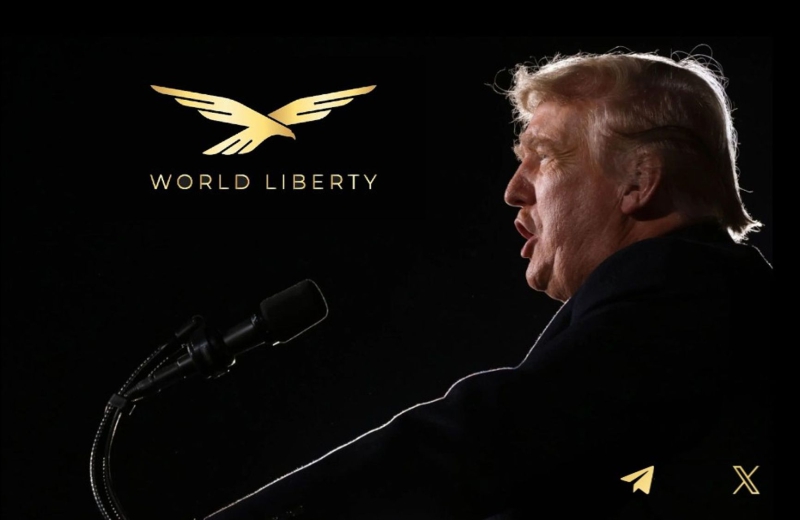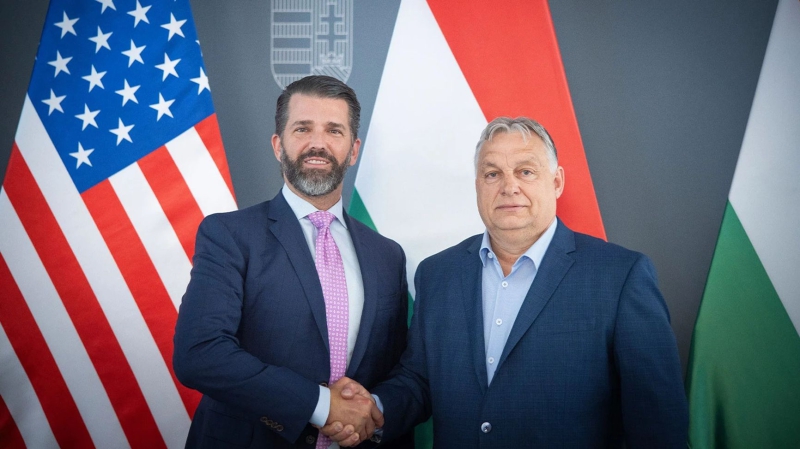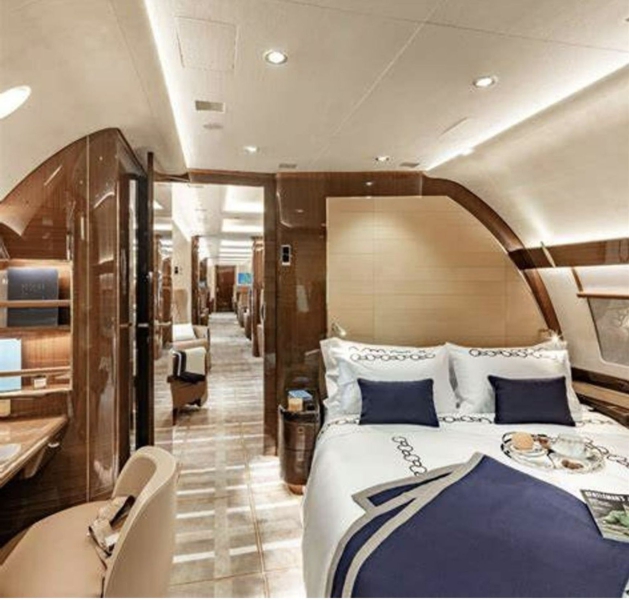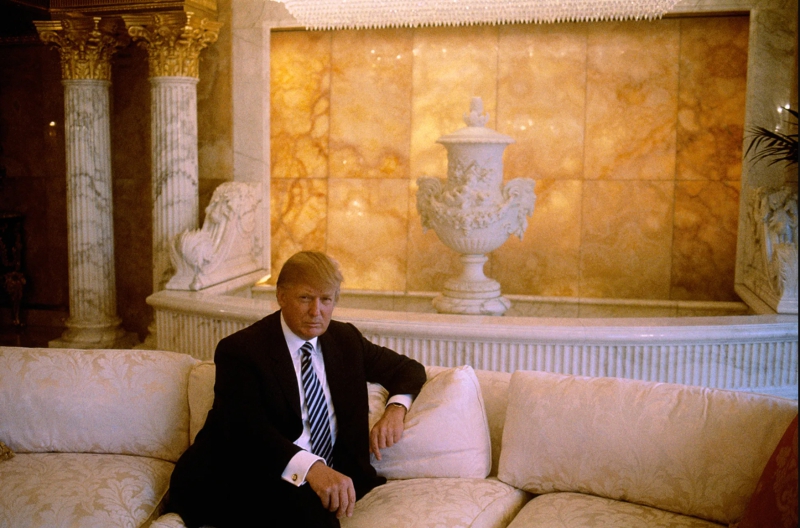Donald Trump recently offered crypto investors an unpalatable but exclusive lunch — on average, the attendees paid $1.7 million for the privilege of sitting at his table. Before that, Trump received a lavish $400 million private jet — a “gift” from the Qatari government — which he plans to use for official travel and then hold onto even after leaving office. Meanwhile, the 47th President’s fortune is rapidly growing — fueled not only by his own cryptocurrency ventures, which are attracting foreign buyers, but also by international deals involving his family members.
Donald Trump is the wealthiest president in U.S. history, and his cabinet cabinet is the wealthiest ever as well. Since his return to the White House, Trump’s wealth has only continued to grow. A year ago, his net worth was estimated at $2.4 billion. By the start of his second term, it had reached $3.7 billion. And now, just three months into his new four-year mandate, that figure has surged to $5.1 billion.
Since the 1970s, the core of Trump’s fortune has been his real estate firm, the Trump Organization, which he inherited from his father. Today, its assets include roughly 20 golf courses and more than 30 buildings that are either directly owned by the Trump family or generate revenue through licensing deals that trade on the family name. The company is valued at around $2.65 billion, accounting for nearly half of the president’s total assets. But as is common in real estate, firms often manipulate property valuations — downward in order to lower their tax burdens, or upward to secure favorable terms on loans. It was exactly this sort of self-interested bookkeeping that landed the Trump Organization in legal trouble — in February 2024, a New York court fined the company $355 million and temporarily barred it from doing business in the state.
In 2021, after being banned from many social media platforms in the wake of the January 6th riot, Trump launched the Trump Media & Technology Group (TMTG), along with the Twitter clone social network Truth Social. It is there that the president comments on current events, attacks opponents, and announces many of his policy decisions. In 2024, TMTG went public, reaching a valuation of $6.7 billion by the end of its first day of trading on the NASDAQ. It is now valued at $5.4 billion. Trump and his family own more than half of the company’s shares, making their combined stake worth a total of $2.3 billion.
But TMTG’s business performance has been underwhelming. In 2024, its revenue totaled just $3.6 million, while operating losses reached $400 million. As of February 2025, Truth Social had an average of only 304,000 daily active users in the U.S. By comparison, BlueSky has 3 million users, and Twitter (X) boasts 25 million.
These estimates of the president’s net worth do not include his personal cryptocurrencies — the $WLFI token and the meme coin $Trump. The value of these assets has surged over the past six months and is now approaching $3 billion — more than the rest of Trump’s business holdings combined. Very little is known about who has invested in the Trump family’s crypto ventures, and in the meantime, his administration is pushing for even deeper deregulation of the sector.
In the summer of 2024, Trump and his sons began promoting a crypto project called World Liberty Financial. Unlike cryptocurrencies such as Bitcoin or Ethereum, which can be traded on exchanges, the initiative’s $WLFI token has a fixed price, cannot be transferred, and is available only to accredited investors.

With vague promises that $WLFI holders will be able to “shape the project’s future” — and with Trump’s three sons listed as company advisors — the market sees the token less as a serious investment vehicle and more as a way to gain proximity to America’s first family. Trump himself is officially listed by the firm as its “Chief Crypto Advocate.”
Trump is officially listed as the WLFI’s “Chief Crypto Advocate”
The tokens are sold at prices ranging from 1.5 to 5 cents, with 75% of the proceeds going to organizations linked to Trump. Among the top 50 holders of the $WLFI token, nearly half are believed to be foreign nationals, as they purchased the tokens through crypto exchanges that prohibit trading by U.S. citizens. One of the largest buyers was Hong Kong crypto entrepreneur Justin Sun. In November 2024, Sun bought $30 million worth of $WLFI tokens, became an advisor to the company, then invested another $45 million. These contributions helped $WLFI earn around $56 million.
By then, Sun had already been accused of market manipulation. In March 2023, it was alleged that he had used his companies — Tron Foundation Limited, BitTorrent Foundation Ltd., and Rainberry Inc. — to bring in over $30 million in undeserved profits. And yet, in February 2025, the new leadership of America’s Trump-appointed Securities and Exchange Commission (SEC) suspended the case against the Hong Kong businessman. (Previously, Trump had accused his predecessor Joe Biden’s son, Hunter, of doing business with China and receiving $1.5 billion from Chinese entrepreneurs.)
The SEC also agreed to withdraw a lawsuit against Coinbase, the largest U.S. cryptocurrency trading platform, which had been accused of operating an unlicensed exchange, broker, and clearing agency. During the 2024 presidential campaign, Coinbase donated $75 million in support of Trump. After his victory, the company contributed another $1 million to his inauguration committee, with an additional $17 million coming from other crypto firms.
The day before the inauguration, Trump launched the meme coin $Trump. Eighty percent of the tokens are owned by organizations affiliated with Trump, although the full issuance is slated to be spread over three years. As of mid-March, the coin was trading at around $11, and with a planned total of 1 billion tokens, Trump could theoretically expect profits in the billions (even though the project’s market capitalization has fallen nearly 85% since launch). Estimates suggest the president, his family members, and business partners have already earned between $100 million and $350 million in trading fees.
The meme coin’s price rose following news that Trump would host a private dinner for the 220 largest token holders. The top 25 holders were promised an “ultra-exclusive VIP meeting with the president” and a White House tour. Critics argue that Trump’s crypto ventures offer an unprecedented opportunity for American and foreign businesspeople and officials to enrich him — without attracting too much public scrutiny, thanks to the anonymity crypto investors enjoy.
Following the meeting announcement on April 23, there were 436 single purchases of the meme coin, each worth over $100,000. The 17 largest transactions, totaling nearly $15 million, were made through foreign exchanges. Of the top 220 token holders eligible to attend the dinner with Trump, 56% purchased the token via foreign platforms. About 60 of them live in China and Southeast Asian countries. Among the top 25 potential attendees for the exclusive VIP meeting with the president, 19 are believed to be foreigners. In conversations with journalists, many buyers admitted they acquired the meme coin with the aim of lobbying for their business interests during the meeting with Trump.
Many buyers admitted they acquired the meme coin to lobby for their business interests during the meeting with Trump
The first meeting took place on May 22 at the president’s golf club in Virginia. Around a hundred protesters greeted the attendees, chanting “shame.” Along with Hong Kong billionaire Justin Sun, the event was attended by Korean crypto investor Sannok Oh, Australian investor Kain Warwick, head of the Taiwanese company Kronos Research Vincent Liu, and head of the UK-based crypto trading firm Wintermute Yevgeny Gaevoy.
The White House declined to release the full guest list, and Trump’s press secretary Caroline Leavitt stated that the president was attending in a private capacity, calling accusations that her boss was exploiting public office for personal gain “absurd.”
Democrats in Congress are demanding investigations into Donald Trump and members of his family, accusing them of corruption and of selling access to the president to people and companies, including to foreign nationals and corporations with financial interests in the U.S. In February, the Securities and Exchange Commission announced it would not exercise oversight over meme coins. And in April, the Justice Department disbanded its crypto crimes unit, citing as the reason one of Trump’s executive orders.
Cryptocurrencies are just one of the tools the Trump family is using to profit from its political influence. In Washington, Donald Trump Jr., together with his business partner Omid Malik and the sons of special envoy to the Middle East Steve Witkoff launched the Executive Branch club. Access is by invitation only, and the membership fee is half a million dollars. Lobbyists and several members of the Trump administration have already joined. The opening was attended by Attorney General Pam Bondi and Securities and Exchange Commission Chairman Paul Atkins — who are responsible for investigating and regulating such schemes.
Donald Trump Jr. and the sons of Steve Witkoff co-founded the Executive Branch club with a $500,000 fee
During Trump’s first term, the Trump Organization — which was being run by the president’s sons — had pledged not to conduct business outside the United States. That restriction has since been dropped, and the company has reaped significant benefits from its overseas ventures. During the election campaign, the Trump Organization announced a $1.5 billion deal to build a complex of hotels, golf courses, and luxury homes in Vietnam. In March of this year, Vietnam’s prime minister hosted Trump’s partner Charles Boyd-Bowman, head of the investment firm IDG Capital Vietnam, who stated openly that the authorities were helping fast-track construction.
The Vietnam deal was not without precedent. In June 2024, Trump’s sons struck a deal to build a hotel and golf course in Oman. Their partners included the Omani Ministry of Tourism, which will receive a share of the profits, and Saudi-based firm Dar Global, which has ties to the Saudi government. After the election, the Trump Organization began construction on several residential developments in major Indian cities, including Bangalore, Hyderabad, Noida, and Mumbai. The total value of these projects exceeds $1 billion.
In late April, Donald Trump Jr. visited several Eastern European countries. In Hungary, he met with the foreign minister and gave a paid speech to local business figures, calling Hungarian Prime Minister Viktor Orbán “one of the last bastions of light” in Europe. Trump and Orbán regularly praise each other, and in 2025 Hungary hosted the annual Conservative Political Action Conference (CPAC), which was paid for by the Hungarian government.

In Bulgaria, Donald Trump Jr. was one of the keynote speakers at an event organized by the crypto company Nexo, which has been accused in the United States of money laundering and fraud and was fined $45 million for its misdeeds. Among those in attendance was Delyan Peevski, a Bulgarian media tycoon and politician who is under U.S. Magnitsky Act sanctions for corruption. The son of the U.S. president also met with former Bulgarian Prime Minister Boyko Borissov, who in 2022 was suspected of fraud involving European Union funds.
In Bucharest, Romania, Trump Jr. spoke at the Trump Business Vision 2025 conference, sharing the stage with a number of local politicians who have also been accused of corruption. Among them were media mogul and politician Dan Diaconescu, who was convicted of extortion in 2015 and sentenced to five years in prison, and billionaire Ion Țiriac, who has been accused of benefiting from opaque privatization deals.
Trump Jr.’s trip was facilitated by former Romanian Prime Minister Victor Ponta, who had previously been hosted by Trump and his son at their Mar-a-Lago residence. Ponta resigned in 2015 amid corruption allegations and ran for president in 2025, finishing in fourth place.
During his tour of Eastern Europe, the president’s son also met with Serbian President Aleksandar Vučić. Serbian authorities allocated land to the Trump Organization at the site of the former Ministry of Defense building in Belgrade — which was destroyed in a NATO missile strike in 1999 — for the construction of a luxury hotel and residential complex. The project is being financed by the president’s son-in-law Jared Kushner, whose investment fund has received over $3.5 billion from the governments of Saudi Arabia, Qatar, and the UAE. With that money, Kushner also plans to build a $1.4 billion villa compound in Albania.
Serbia allocated land to the Trump Organization at the site of the former Ministry of Defense building, destroyed by NATO missiles in 1999, for the construction of a luxury hotel
In May, President Trump visited three Persian Gulf monarchies as part of a Middle East tour. He later claimed to have signed deals with their governments totaling $4 trillion in investments for the American economy. This figure appears highly inflated, as it roughly matches the combined size of these countries’ sovereign wealth funds. In Riyadh, Trump announced that the U.S. had agreed to sell Saudi Arabia a weapons package worth about $142 billion. Qatar signed a deal to purchase 160 Boeing aircraft for $96 billion, while the UAE signed a $1.4 trillion artificial intelligence agreement under which the U.S. would permit the export of advanced technology chips.
All three countries maintain extensive business ties with the Trump family. In Jeddah, Saudi Arabia, the Trump Organization secured a contract to build a Trump Tower, and in the capital, Riyadh, it is licensing its brand for two new real estate developments.
In Qatar, the company struck a deal to build a luxury golf resort in partnership with construction firm Qatari Diar. The project is backed by the country’s sovereign wealth fund.
And in the UAE, at a crypto conference in Abu Dhabi, a state investment company announced that it had selected the Trump family’s World Liberty Financial stablecoin to support a $2 billion investment in Binance, the world’s largest cryptocurrency exchange.
While in Saudi Arabia, Trump also met with Syria’s interim president Ahmad al-Sharaa, whom he described as “a young, attractive guy and a real leader.” Following the talks, Trump announced that the U.S. would lift sanctions on Syria. Earlier, al-Sharaa had offered the Americans access to Syrian oil and even floated the idea of building a Trump Tower in Damascus. In addition to al-Sharaa himself, sanctions were lifted on Syrian Arab Airlines, the Syrian central bank, several state oil and gas companies, and the Four Seasons Damascus hotel. Secretary of State Marco Rubio justified the decision by citing the risk of government collapse and the potential for the continuation of civil war.
During his visit to Qatar, Trump received a lavish gift from the country’s leadership — a Boeing 747-8 aircraft. The press has dubbed it a “flying palace,” and it has been valued at $400 million. It is not only the most expensive gift ever received by a U.S. president, but its worth is a hundred times greater than the total cost of all gifts given to U.S. presidents by foreign governments over the past 25 years.
The plane gifted to Trump is worth one hundred times more than all the gifts received by U.S. presidents from foreign governments over the past 25 years
The U.S. Constitution explicitly prohibits the president and other officials from accepting gifts from foreign powers without the consent of Congress. By law, the head of state and all federal employees may keep gifts from foreign governments only if their value does not exceed $480. More expensive items may be accepted, but they must then be handed over to the National Archives. If the president or any official wants to keep a gift personally, they must pay its full value out of their own pocket.
The Trump administration insists that the Qatari authorities donated the aircraft to the United States, not to Trump personally, and that the jet will now be registered on the Pentagon’s balance sheet. However, journalists discovered that the request for the aircraft originated from the White House itself. The ostensible reason: the two current presidential planes are aging, and there have been delays in Boeing’s delivery of a new one. However, in order to meet U.S. requirements for secrecy and security, the Qatari jet will need a major overhaul that could take years — and cost more than a billion dollars in taxpayer funds. Moreover, Trump may be able to continue using the plane even after his term ends, as it is set to be transferred to his presidential library.

The legality of the deal is drawing growing scrutiny. Yes, it was approved by White House lawyers and Attorney General Pam Bondi. But back in 2019, Bondi registered as a lobbyist for Qatar, earning a salary of $115,000 a month. Until 2025, she also lobbied on behalf of the Kuwaiti government and KGL KSCC, a logistics firm and Pentagon contractor in the Middle East that has been accused of extortion.
In its defense, the administration points to the precedent of SAM 27000, which was transferred to the Ronald Reagan Presidential Library. But that plane was not a foreign gift, nor was it handed over immediately — instead , it was decommissioned in 2001 after nearly 30 years of service, and Reagan, who was already 90 years old by the time, never flew on it after his presidency. The plane really was a museum piece.
The transfer of the aircraft to the U.S. government may be legal in itself, but its subsequent listing as an asset of the Trump family appears highly questionable
Democrats have been vocal in their criticism of Trump, accusing him of accepting a bribe from the Qatari government. An attempt to introduce a bill in the Senate that would prohibit the president from using a foreign aircraft failed. Unsurprisingly, the measure was blocked by Republicans.
Still, even some Republican senators expressed skepticism regarding the Qatari royal family’s generosity. And conservative media figures were even more candid — among them, Turning Point USA founder Charlie Kirk and activist Laura Loomer, whom Trump recently hosted at the White House. They voiced concern over the fact that the plane was a gift from the Qatari authorities — an American ally, but one known for its support of the terrorist group Hamas.
U.S. law on conflicts of interest prohibits public officials from taking actions that benefit themselves or their family members. But that law does not apply to the nation’s highest office. The only available mechanism to prevent Trump from continuing to do what he is doing is impeachment, which the Constitution allows for in cases of corruption. But given the current state of partisan polarization, it's hard to imagine an impeachment securing the 67 votes in the Senate required to remove a president from office.
And even in the event that he accepts a direct bribe, Trump would likely escape legal liability after leaving office. Last July, a Supreme Court ruling granted broad immunity to former presidents.

